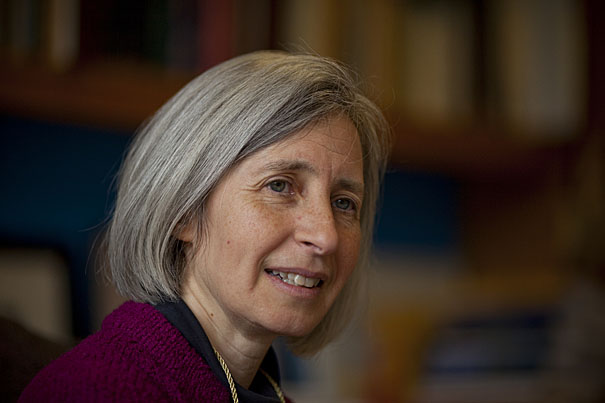
“This new fund is inspired by our students’ passion for justice,” said Harvard Law School Dean Martha Minow. “It’s an investment that will pay dividends not only for our students but also for the countless number of people whose lives they will touch during their public service careers.”
File Justin Ide/Harvard Staff Photographer
HLS creates public service fund
Will offer ‘seed money’ for start-up nonprofit ventures
Harvard Law School today (Feb. 9) announced the creation of the Public Service Venture Fund, which will start by awarding $1 million in grants every year to help graduating students pursue careers in public service.
The first program of its kind at a law school, the fund will offer “seed money” for start-up nonprofit ventures and salary support to students who hope to pursue postgraduate work at nonprofits or government agencies in the United States and abroad.
“This new fund is inspired by our students’ passion for justice,” said Harvard Law School (HLS) Dean Martha Minow. “It’s an investment that will pay dividends not only for our students but also for the countless number of people whose lives they will touch during their public service careers.”
The creation of the Public Service Venture Fund is the latest step taken by the Law School to offer new forms of assistance for students who are interested in public service careers. In November, Minow announced an increase in the availability of financial aid overall and a broadening of eligibility for the School’s loan relief program. She also established 12 new Holmes Fellowships for students interested in postgraduate public service work. All told, financial support for students interested in public service has increased by $2.75 million this year.
To obtain support from the new fund, applicants will submit proposals explaining how the postgraduate grants will help them get started in public service. Minow said the fund will bolster the creative thinking of publicly spirited law graduates at a time when the legal profession itself is becoming more entrepreneurial.
“The new venture fund is exactly in sync with that,” said Professor David Wilkins, the faculty director of the Program on the Legal Profession and the Center on Lawyers and the Professional Services Industry at Harvard Law School. “It’s also in sync with the values emphasized in our curriculum, and with our pro bono ethos and our strong emphasis on clinical education, all of which encourage students to think creatively about designing interesting projects and approaches to helping people.”
The new venture fund follows a three-year pilot program covering the third year of HLS tuition for graduates who commit the first five years of their careers to public service. It will offer targeted and flexible support for students who are embarking on public service careers, said Alexa Shabecoff, Harvard Law School’s assistant dean for public service.
“When jobs are especially hard to come by, the fund may provide fellowships in order to create jobs,” Shabecoff said. “It will also supplement salaries for graduates hoping to work for nonprofits that can only afford to pay for part-time positions. In this ever-shifting legal job market, we will offer our students the ability to land the job of their dreams or create it.”
A number of HLS alumni have started nonprofits straight out of law school or soon thereafter, such as Alan Khazei ’87 and Michael Brown ’88, who started City Year, and Jennifer Gordon ’92, who started the Workplace Project and won a MacArthur “genius” award for her work. “The new Venture Fund honors some of our most successful and inspiring alumni even as it plants the seeds for the next generation of public service leaders and social entrepreneurs,” Minow said.
The fund is planned to start with distributions of $1 million annually and to increase as the Law School works to raise additional resources, Minow said.
The fund will be governed by a board established by the dean. The board will include senior administrators, faculty members, and alumni from both the private and public sectors.




